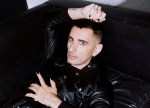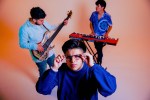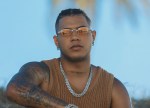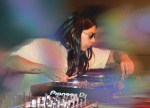The world was a different place when Christian Chávez was first thrust into the limelight. From his career highs as a member of RBD to personal lows amidst a battle with mental health, Chávez spoke to Remezcla about how he emerged from those experiences more resilient than ever. The star also discussed the changing landscape of LGBTQ+ representation and the upcoming RBD reunion tour.
The Mexican singer and actor first burst onto the scene with the premiere of “Rebelde” in 2004. “We never thought that ‘Rebelde’ would become so big,” Chávez says modestly. The teen telenovela quickly became appointment television, and its spinoff pop group, RBD, took the music industry by storm. Alongside bandmates Anahí, Dulce María, Maite Perroni, Christopher von Uckermann, and Alfonso Herrera, they became nearly overnight sensations with hits like “Sálvame” and “Nuestro Amor.”
But Chávez’s journey to stardom came with challenges. In 2005, he secretly married his partner in a private ceremony in Canada. Two years later, one of “Rebelde”’s producers made Chávez aware of a blackmail plot to leak private wedding photos. “I didn’t have anyone to tell me, ‘You have to do it this way,’ ‘We’re gonna support you,’” he shares. “At that moment, I had nobody.”
Chávez was at a turning point, but he was determined to be the representation he wished he had growing up. “When I was 16 years old, I asked God to change me, but he didn’t. [I wished] that there was someone there to tell me on TV, ‘Hey, it’s okay to be gay. It’s okay to be you, so don’t worry.’” His producer confidant published an open letter by Chávez to RBD’s official website without the network’s knowledge. “I didn’t know how to write one,” he admitted. “I couldn’t even write the word ‘gay.’” The news took over headlines the following day. “At first, it seemed like everyone took it well,” he says. “On the outside, everyone was accepting, but when it came to work, all the doors were shut.”
After RBD disbanded, Chávez faced dwindling professional opportunities. “To go from something so successful to having nothing and then having to prove yourself all over again,” he says as he explains how he found himself confined to yet another closet. “Some people said that my sexuality needed to be hidden, that it shouldn’t be obvious for my sake, for the sake of my job, and that I shouldn’t get involved with the community. I wasn’t myself, and I wasn’t free.”

Navigating a career as an openly gay pop star at that time was uncharted territory. The personal and professional struggles he encountered plunged his mental health. “I fell into a deep depression, and my anxiety attacks were very complicated,” he shares. In late 2013, Chávez survived a suicide attempt.
Chávez then embarked on a long journey to recovery, seeking professional help and introspection. Alongside his return to music and pursuit of new acting projects, another part of his healing process was actively participating in the LGBTQ+ community. He used his platform to advocate for HIV and suicide prevention and LGBTQ+ rights. “Something that moved me was learning about the stigmas against people living with HIV,” he says. “Learning to be supportive of trans people, talking about gender, [and] inclusive language. For me, these are battles that add up, and I make them mine because I feel like life gave me a microphone, and it’s important to use it.”
The landscape of LGBTQ+ representation has seen significant progress since the early 2000s, and for Chávez, they haven’t gone unnoticed. “I was telling my mother, ‘What would’ve happened if my generation had something like [Netflix’s ‘Heartstopper’]? If we could have seen how beautiful and natural it is to be yourself at that age?’” Another marker of change within the Latine community is the premiere of “Drag Race México,” in which Chávez appeared as a guest judge on the first episode.

However, he acknowledges the uphill battle that continues, with ongoing opposition aiming to turn back the clock and further marginalize the community. “It’s terrible to see what’s happening in Florida and other states,” Chávez says in response to a wave of anti-LGBTQ+ legislation in the U.S. “I can’t believe it. But it’s incredible to see the new generation stand up and demand their rights.”
It’s a critical time for the community, but Chávez seems grounded yet alert in his activism. “At any moment, they can take it away from us,” he says with conviction. “We have to be united because united is where we find our strength.”
Chávez is looking forward to RBD’s upcoming Soy Rebelde Tour, which is set to begin on Aug. 25 in El Paso, TX, and will be their first tour since 2008. “I still can’t believe it; it’s like a dream come true,” he says in disbelief. “After 14 years, the world has changed so much. Reggaetón is king, and pop isn’t anymore. We were like, ‘Oh my God, what’s going to happen? Surely people were gonna call us los viejitos. Who’s gonna come see us?’”

“Some people said that my sexuality needed to be hidden, that it shouldn’t be obvious for my sake, for the sake of my job, and that I shouldn’t get involved with the community. I wasn’t myself, and I wasn’t free.”
The trek, filled with arena and stadium dates across the U.S. and Latin America, quickly became one of the hottest Latine concert tickets and resulted in countless sold-out shows. “The love [we’ve been receiving] doesn’t stop surprising us. It’s something that gets us emotional, and we’re thankful for it,” he says.
Chávez remains tight-lipped about divulging tour details now that rehearsals are well underway. “We’re preparing a show so big that fans deserve and that this reunion deserves,” he says confidently. He also hinted at the possibility of seeing their iconic “Rebelde” uniforms making a comeback. When asked about new music and any possible collaborations, Chávez neither confirms nor denies it. “I can’t talk about that because it’s gonna be a surprise!”
He eagerly awaits the moment he steps onto the stage as his most authentic self, exclaiming, “To be on stage again, being myself, without any restraint? It’s going to be something really incredible.”
After the Soy Rebelde Tour wraps up in December, Chávez isn’t sure what’s next, but he doesn’t seem worried. Instead, he chooses to embrace tranquility and optimism, finding utmost joy in the simple moments. “To wake up, express gratitude, open a window, see the sun, feel the air, bathe, exercise, read a book, talk to my siblings, and all of those little things we take for granted.”
“Everyone has this concept that happiness [is something] we find outside,” he continues. “Happiness is within ourselves. It’s a choice many times; it’s a choice that takes work.”

Christian’s choice has never been more clear—to live his life to the fullest and not just survive it.
If you or someone you know is considering suicide, help is available. Call 1-800-273-8255 to speak with someone now or text START to 741741 to message with the Crisis Text Line.




